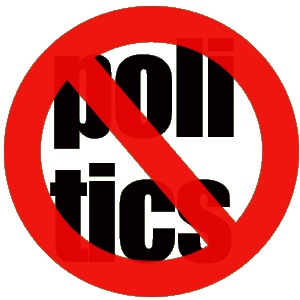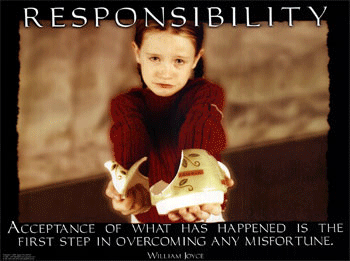The Responsibility Ethic, Part 5: The Politics of Responsibility

This is the final installment in my series on what I've been calling the "responsibility ethic" in personal development -- the notion that it's best to see ourselves as responsible for our life circumstances, as opposed to seeing our situation as the product of chance or forces beyond our control.
Today, I'll address an argument often made by critics of personal growth that has to do with the relationship between the responsibility ethic and politics. This is a complicated argument, but I think it's an important one, so bear with me as I flesh it out a little.
Is The Responsibility Ethic Anti-Political?
The critics argue that, if I believe I'm responsible for my circumstances, I am unlikely to participate in politics -- to vote, protest, debate issues with others, and so on. In other words, if I think I hold the power to change my life situation, I won't see any need to use the political process to improve my circumstances.
Say, for instance, that I run a business, and a tax imposed by the city is hurting my bottom line. If I believe I have full control over my destiny, I won't see any reason to lobby the city government to reduce the tax. After all, because I have the power to fix the situation, I can solve the problem myself -- by, say, moving elsewhere, or just increasing my revenues to make up for the loss.
To the critics, because it convinces people there's no need to participate in politics, the responsibility ethic is anti-democratic, in that it discourages an informed, politically active public. What's more, the critics argue, we do need the political process to change aspects of our life situation. Critics with a left-wing bent commonly argue that only the government can remedy the economic unfairness in our society, and the responsibility ethic blinds the "have-nots" to this by deceiving them into thinking they, individually, can solve their financial problems.
Thus, they might say, the responsibility ethic serves as a kind of "opiate for the masses." As sociologist Micki McGee writes, personal growth teachings tend to trap their followers in a futile "cycle of seeking individual solutions to problems that are social, economic, and political in origin."
Clearing Up Some Confusion
Simply put, I think this argument misunderstands the responsibility ethic. All the responsibility ethic says is that I am responsible for the situation I'm in, and I have the ability to change that situation if I wish to do so. It does not address the specific actions I should take to improve my situation, or whether "political action" is a good option.
We can understand this by returning to my earlier example, where my city imposes a tax I think is bad for my business. If I accept the responsibility ethic, I will believe I'm capable of improving this situation. But the question remains: what is the best way to change it? Should I move to another city? Try to increase my revenue? Lobby the city council to repeal the tax? The responsibility ethic is silent on this issue.
In other words, it doesn't follow from my belief that I can improve the situation that political activity will not be an effective method of doing so. Supporting a politician who pledges to repeal the tax might indeed be an effective method of getting what I want. Thus, I think it's a mistake to cast the responsibility ethic as inherently anti-political.
The Politics of "Non-Responsibility"
This becomes even clearer when we consider the extreme opposite of the responsibility ethic, which I'll call the "non-responsibility ethic." A person who accepts the non-responsibility ethic (in other words, someone with an external locus of control) sees events in their lives as the product of luck, or of forces they can't control.
Suppose I believe in the non-responsibility ethic, and I'm faced with the same situation where the city tax is hurting my business. If I believe my actions are unlikely to make a difference, what will I do to improve my situation? If I really think I'm a helpless pawn of fate, I'll probably do nothing.
As this example illustrates, it's also a mistake to call the responsibility ethic inherently politically conservative, as left-wing critics of personal growth tend to do. If these critics want to see more redistribution of wealth, it won't help them to have a nation of people with an external locus of control who feel powerless to change the status quo.
In light of this, it's no surprise that some of the most popular personal growth books use political leaders to illustrate their ideas. Even the much-maligned Think and Grow Rich cites Gandhi as "one of the most astounding examples known to civilization of the possibilities of faith." Gandhi's faith in his ability to change the world, writes Napoleon Hill, drove his contribution to ending British rule of India.
The Psychology of Responsibility
I won't harp too much on the psychological evidence, because I've done it a lot in past posts. Suffice it to say that several psychological studies have suggested that people with an internal locus of control -- a belief in their own capacity to affect events -- are actually more inclined to participate in politics.
For example, one study surveyed some newly voting-aged college students, and found that the ones who described themselves as having an internal locus of control were more likely to vote in a presidential election. Another found that people who tended toward an internal locus of control were more likely to participate in political activism.
In other words, it seems that a person's belief that they're responsible for their circumstances leads them to be more politically active, not less, which also belies the critics' claim that the responsibility ethic is somehow anti-political.
In my next post, because I find this issue fascinating, I'll talk more generally about the political implications of personal growth and spirituality.
Other posts in this series:
The Responsibility Ethic, Part 2: Responsibility Vs. Blame

This post continues my discussion of what I've called the "responsibility ethic" in personal development -- the idea that it's best for us to see ourselves as responsible for our situation in life. I've been looking at the common argument that buying into the responsibility ethic causes people to beat themselves up over the setbacks they face. You can read the last post in this series here.
2. Responsibility Vs. Blame
The critics of personal growth aren't the only ones aware of what I'm calling the "self-blame argument." Many personal development teachers understand it as well. What they often say is that it's possible to see ourselves as responsible for our circumstances without blaming ourselves for them. In other words, if we suffer a setback, we can admit how our actions contributed to it without suffering over it. If I'm in debt, for instance, I can acknowledge what I did to create the debt without calling myself lazy or stupid.
As we saw earlier, psychological research suggests that people can, and do, make this "responsibility versus blame" distinction. People who tend toward an external locus of control -- the belief that they lack control over their lot in life -- often punish themselves for the difficult events in their lives, even though they see themselves as helpless.* People who tend toward an internal locus of control, although they see themselves as in control of events, actually do less self-flagellation when they get bad results.
Some critics acknowledge this distinction but reject it, arguing that it effectively destroys any notion of morality. For example, in Self-Help Inc., sociologist Micki McGee derides Deepak Chopra's discussion of responsibility in The Seven Spiritual Laws of Success, in which Chopra advocates "not blaming anyone or anything for your situation, including yourself." "This notion of responsibility," writes McGee, "suspends the literal meaning, ensuring that no one is actually accountable for anything," and creating "a mystical world without need of morality or ethics."
The Philosophy Behind Self-Blame
Is this true? Let's take this question to a deeper level. As I think you'll see, this discussion is a good example of how the debate over personal growth ideas raises some important, and timeworn, philosophical questions.
What is self-blame? I'd put it this way: When we blame ourselves for an event in our lives, we are 1) judging ourselves as worthy of punishment or suffering because it happened, and 2) administering punishment -- by, perhaps, tensing our bodies painfully when we think about the event. For example, I'll bet you can think of a time when you got really angry at someone, in a way you now see as inappropriate -- and that you cringe (punish yourself) when you remember it.
When you think about it, the idea that I should suffer because of something I did is based on some interesting metaphysical assumptions. The idea seems to be that, when I do something wrong (whatever that may mean to me), I basically knock the universe out of balance. I can only restore the cosmic equilibrium by experiencing suffering proportional to the suffering of my victim. The fancy philosophical term for this idea is "retributive justice."
We see this mindset in how people tend to talk about the criminal justice system. For instance, people often say of a criminal that he must "pay for his crime." This means that the criminal has drawn on a sort of "cosmic bank account" by creating suffering for another person, and he must repay the "debt" through his own suffering -- most likely, by going to prison for some number of years.
Justice Without Retribution
In essence, many personal growth teachers, while asking us to take responsibility for our situation, also invite us to let go of the philosophy of retributive justice. I can acknowledge my role in creating my circumstances, they say, without punishing myself if those circumstances aren't up to my standards. What's more, when I stop wasting time and energy punishing myself for the past, I become able to look to the future and take constructive action -- make a plan to reduce my debt, perhaps, or look for a new relationship.
If we do what these teachers suggest and let go of the retributive justice idea, do we also eliminate morality? I think not. It's certainly possible to believe in moral rules -- that is, rules of right and wrong conduct -- without accepting the concept of retributive justice.
I could believe, for instance, that stealing is wrong, without also believing in retribution against people who steal. Instead, I might believe that people who steal should be required to pay their victims the money they stole, or the value of the property they took, to put the victim in the position he was in before the theft. In other words, I may accept what's called compensatory justice, but not retributive justice.
What's more, I would be far from the first to take this stance -- many philosophers have argued against the concept of retributive justice, and the notion that people should suffer for their misdeeds to restore some abstract cosmic balance. The idea of dispensing with retribution against ourselves and others is not some kooky New Age innovation.
But Isn't Guilt Good For Society?
Now, I think some personal growth critics would acknowledge that we can retain some notion of right and wrong, even if we stop blaming or punishing ourselves when our results are less than perfect. But that, the critics might argue, is not the real issue -- the point is that, if we don't blame ourselves when we act wrongly, morality loses any practical significance.
The very reason we act morally, they say, is because we're afraid that, if we don't, we'll beat ourselves up over it. If people lost the capacity to self-blame, society would descend into violent anarchy. "There's a name for people who lack guilt and shame: sociopaths," writes Wendy Kaminer in I'm Dysfunctional, You're Dysfunctional. "We ought to be grateful if guilt makes things like murder and moral corruption 'harder.'"
What will I say about this? It's a nail-biting cliffhanger! Stay tuned, dear readers, for Part 3 of The Responsibility Ethic.
As psychologist Helen Block Lewis puts it in The Many Faces of Shame, "behavior theorists have described a cognitive paradox in depression: If depressed people are as helpless as they feel, logic dictates that they should not also feel self-reproaches (guilt) for what they are unable to do." And yet, oddly enough, they do feel guilt.
Other Posts In This Series:

